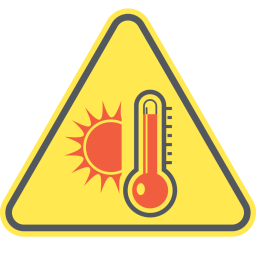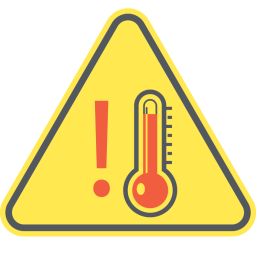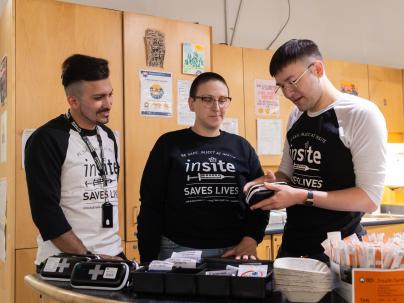Extreme heat
On this page
- Health effects of extreme heat
- People at higher risk
- Health effects of extreme heat and ways to reduce risk
- Steps to protect yourself and others from heat
- How to check-in and support others during hot weather
- Cooling centres and cooling spaces
- “Heat Warnings” and “Extreme Heat Emergencies”
- Special considerations for mental health and substance use
- Extreme heat research and data
- Extreme heat resources
- Resources for health professionals

High heat can be life-threatening, and the greatest danger is high indoor temperatures during extreme heat events (“heat waves”). But heat-related health impacts are preventable. Learn the signs of heat-related illness, and ways to prepare for hot weather to keep yourself, your family, friends, and neighbors safe.
Related: Climate Change and Health
Health effects of extreme heat
Extreme heat events, also known as “heat waves,” can cause a number of heat-related illnesses, and can lead to an increase in deaths. Heat-related illness is a broad term for conditions caused by high heat, such as heat rash, sunburn, heat cramps, heat exhaustion, and the most severe, heat stroke.
Heat exhaustion
Symptoms of heat exhaustion include:
- Heavy sweating
- Skin rash
- Dizziness
- Nausea or vomiting
- Rapid breathing and heartbeat
- Headache
- Difficulty concentrating
- Muscle cramps
- Extreme thirst
- Dark urine and decreased urination
If someone has symptoms, help them move to a cool place if you can. Give them water, loosen or remove extra clothing, and cool their body with ice packs, wet towels, or damp clothes. Keep cooling them and giving water until they feel better. If the symptoms get worse or don’t improve, seek health care support.
Heat stroke
Symptoms of heat stroke include:
- High body temperature (39°C/ 102°F or higher)
- Fainting or drowsiness
- Confusion
- Lack of coordination
- Very hot and red skin (may be dry)
Heat stroke is a medical emergency. Get medical help immediately at an emergency room or urgent care centre. Call 9-1-1 if necessary. While waiting for help, move the person to a cool place if possible. Cool them quickly with ice packs, wet towels, a sponge bath, shower or dampen their clothes. Keep cooling them and stay with them until help arrives.
If you are unsure or have any non-emergency questions, call 8-1-1 to speak with a nurse.
People at higher risk
People respond differently to heat, and some people are at higher risk of experiencing health effects. Staying cool is especially important for the following groups of people:
- Older adults, aged 60 years or older
- People who live alone or are socially isolated
- People with pre-existing health conditions such as diabetes, heart disease or respiratory disease
- People with mental illness such as schizophrenia, depression, or anxiety
- People with substance use disorders, including alcohol
- People with limited mobility
- People who are marginally housed
- People who work or live in hot environments
- People who are pregnant
- Infants and young children
Heat affects people in different ways, and some people may need support to stay cool. During hot weather, pay attention to how you feel and regularly check on those at higher risk. The best way to prevent heat-related illness is to spend time in cool spaces and drink plenty of water.

POSTER
Health effects of extreme heat and ways to reduce risk
Share the signs of heat-related illness and actions to stay safer during heat waves. Translations available.
Download the extreme heat poster (English)Steps to protect yourself and others from heat
The most dangerous aspect of heat waves for most people is high indoor temperatures. Spending time in a cool space and drinking plenty of water is the best way to prevent heat-related illnesses.
Wildfire smoke can also cause health problems. During both wildfire smoke and heat events, consider also filtering your air using HEPA air cleaners. Find out more about wildfire smoke.
-
Keep yourself and other people cool
- Spend time in cooler indoor and outdoor spaces (i.e. community center, library or mall with air conditioning).
- Drink plenty of water and other liquids to stay hydrated, even if you do not feel thirsty.
- Cool off with a shower, bath or soaking part of your body in water.
- Wear a wet shirt or damp towels to cool down.
- Wear loose, light-coloured, breathable clothing.
- Limit activity, especially during the hottest hours of the day (generally 2 p.m. to 4 p.m. in B.C.).
- Watch for signs of heat exhaustion and heat stroke. For heat-vulnerable people, the risk for heat-related illness may increase at indoor temperatures over 26°C (78 °F) and may be very high at indoor temperatures over 31°C (88 °F).
-
Keep spaces cool
- During the day, close windows and shades/blinds to trap cooler air inside and block the sun.
- At night, open windows and doors when it is cooler outside (usually 9-10 p.m. in B.C.). Some bathroom and kitchen fans vent outside and can be used to remove warmer indoor air. Use portable fans to bring cool air into the home overnight.
- Consider getting an air conditioner for your home. If you have air conditioning, be sure to turn it on.
- Monitor indoor temperatures for yourself and those you are checking on. For heat-vulnerable people, the risk for heat-related illness may increase at indoor temperatures over 26°C (78 °F).
“Heat Warnings” and “Extreme Heat Emergencies”
In response to the 2021 BC heat dome, multiple health sector partners, and Environment and Climate Change Canada (ECCC) developed the BC Heat Alert and Response System (BC HARS). This two-level alert system lays out the criteria that ECCC will use to declare a Heat Warning (Level 1) or an Extreme Heat Emergency (Level 2), the appropriate public health messaging for both types of alerts, and the recommended actions for the health sector, local governments, and other partners.
Read more about the BC HARS on the BCCDC website.
Alerts
-

Heat Warning (Level 1)
Threat: Daytime and overnight temperatures are higher than seasonal norms and holding steady.
Action: Take the usual steps to stay cool and check on people at higher risk from heat. -

Extreme Heat Emergency (Level 2)
Threat: Daytime and overnight temperatures are higher than seasonal norms and getting hotter every day.
Action: Activate your emergency plan and check on people at higher risk from heat at least once a day.
Extreme heat resources
-
-
Public weather alerts for British Columbia
Environment and Climate Change Canada (ECCC) weather alerts including heat and air quality.
-
WeatherCAN App
Environment and Climate Change Canada (ECCC) weather alerting app for smart phones with heat and air quality alerts.
-
Hello Weather
Environment and Climate Change Canada (ECCC) automated telephone weather service.
-
-
-
Extreme heat poster - English
Vancouver Coastal Health & Fraser Health
-
Extreme heat poster - Translated
Vancouver Coastal Health & Fraser Health; Available in: English, Arabic, Chinese-Simplified, Chinese-Traditional, Hindi, Korean, Farsi, Punjabi, Spanish, Urdu, Vietnamese and Gujarati
-
Health checks during extreme heat events - Translated
National Collaborating Centre for Environmental Health; Available in: English, French, Punjabi, Simplified Chinese, Traditional Chinese
-
Extreme heat preparedness guide - Translated
Prepared BC; Available in: English, French, Punjabi, Simplified Chinese, Traditional Chinese
-
Fans in extreme heat FAQ
Vancouver Coastal Health & Fraser Health
-
Build your own cool kit - Translated
Vancouver Coastal Health & City of Vancouver; Available in: English, Punjabi, Simplified Chinese, Traditional Chinese, Tagalog, Vietnamese.
-
Heat-related illness in infants and young children - Translated
HealthLink BC; Available in: English, Arabic, Chinese-Simplified, Chinese-Traditional, Farsi, French, Hindi, Japanese, Korean, Punjabi, Russian, Spanish, Tagalog, Ukrainian, Vietnamese
-
Prepared together for extreme heat
Building Resilient Neighbourhoods and Hey Neighbour Collective; Neighbour-to-neighbour connections may save lives during heat events. See tips to connect, learn, & collaborate with neighbours.
-
AC care
Aboriginal Housing Management Association; Recommendations on safe and efficient operation of portable air conditioning units.
-
-
-
Heat check-in support framework for non-governmental organizations
Vancouver Coastal Health and Fraser Health
-
Heat Check-In Training Video
Vancouver Coastal Health
-
Heat Check-Ins: Train-the-Trainer Video
Vancouver Coastal Health
-
Example heat check-in script
Vancouver Coastal Health
-
Heat check-In training slides
Vancouver Coastal Health
-
Heat check-in training: Train the trainer slides
Vancouver Coastal Health
-
Heat check-in practice scenarios
Vancouver Coastal Health
-
Heat check-in practice scenarios: Facilitation guide
Vancouver Coastal Health
-
Extreme weather check-in calls for multilingual seniors
MOSAIC. Available in multiple languages
-
Creating cooling spaces during hot weather: Guidance for community organizations
Vancouver Coastal Health
-
Emergency support for seniors framework
Renfrew Collingwood Senior’s Society
-
Heat stress information for workers
WorkSafe BC
-
Sample heat and wildfire smoke plan for local governments
Vancouver Coastal Health
-
Heat response planning for Southern Interior B.C. communities: A toolkit
Interior Health; Learn what your community can do to prepare for heat.
-
Outdoor gatherings guidance
Vancouver Coastal Health
-
-
-
How to be a heat-healthy business leader
Fraser Health
-
Heat stress information for workers
WorkSafe BC
-
Heat guidance for schools and childcare facilities
Vancouver Coastal Health & Fraser Health
-
Community care facilities and heat
Vancouver Coastal Health
-
Resource guide: heat planning
VCH and Health Emergency Management BC; How community care facilities can begin heat planning and recommended months for each step.
-
Heat response plan template
VCH and Health Emergency Management BC; Fillable heat response plan template for community care facilities.
-
Site assessment checklist
VCH and Health Emergency Management BC; Detailed site and clinical checklists to assist community care facilities with heat planning.
-
Resident risk identification guidance
VCH and Health Emergency Management BC; Criteria to identify residents in community care facilities at highest risk from heat-related illness.
-
Heat response preparation checklists
VCH and Health Emergency Management BC; Brief checklist for community care facilities to complete before each heat season.
-
Heat response temperature log
Vancouver Coastal Health & Health Emergency Management BC; Indoor temperature recording template for community care facilities.
-
Heat response checklist
Vancouver Coastal Health and Health Emergency Management BC; Daily readiness check for community care facilities during heat alerts.
-
Heat-related illness: Prevention and Management in Community Care Facilities
Vancouver Coastal Health & Providence Health Care
-
Extreme heat guidance for restaurants
Vancouver Coastal Health
-
Pool Operators on extreme heat and wildfire smoke
Fraser Health
-
-
-
Summer heat, wildfire smoke and health: Recommended actions for owners and managers of rental and strata housing
Vancouver Coastal and Fraser Health
-
Resources to prepare buildings and facilities for extreme heat
BC Housing
-
Heat wellness check-in card for tenants
BC Housing
-
Creating cooling spaces during hot weather: Guidance for community organizations
Vancouver Coastal Health
-
Extreme Heat and Wildfire Smoke Response Plan Organizational Assessment: Checklist for building operators
BC Housing
-
Resources for health professionals
-
-
Community care during extreme heat
Health Canada
-
Acute care during extreme heat
Health Canada
-
Wildfire Smoke and Extreme Heat Action Plan (with provider instructions)
Legacy for Airway Health, UBC, VCH Research Institute
-
Health facilities preparation for extreme heat
Health Canada
-
Technical guide for health care workers
Health Canada
-
For pharmacists (including medication risk factors)
Health Canada
-
Extreme Heat and Wildfire Smoke FAQ
Vancouver Coastal Health
-
Extreme Heat and Wildfire Smoke Staff Resource
Vancouver Coastal Health
-
















